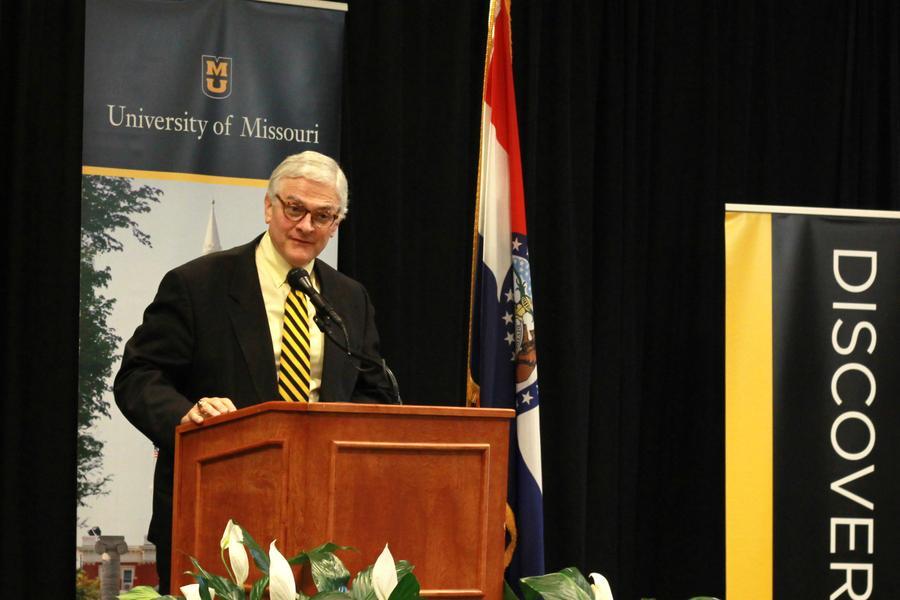
Interim Chancellor Hank Foley spoke to students, faculty and administrators about inclusivity, graduate student rights and goals for the future in the first-ever State of the University address Wednesday afternoon.
“It’s no secret that our beloved flagship university has faced challenges most recently,” interim UM System President Mike Middleton said when introducing Foley. “What should also be no secret is the outstanding leadership that’s in place to ensure that moving forward, this university will learn, grow and become an even better place for our incredible students.”
Foley began his speech to a full crowd in Stotler Lounge in Memorial Union by introducing interim MU administrators who have taken positions since November. He then thanked faculty and staff for their work saying they are “people with great minds and big hearts.”
“We are committed to upholding (our academic values),” Foley said. “But we also must be responsible, accountable and accessible to the public.”
Foley questioned whether or not the university’s selectivity is more important than the school’s output of students. He then went on to recognize students’ accomplishments.
“Mizzou will be a part of your life for the rest of your life. Like any home, like any community, like any family, we’re not without some conflict,” Foley said. “Certainly the events of last semester underscored our pain points. We’ve experienced heated debates and difficult dialogues. We’ve experienced protests and even resignations.”
He recognized that students and alumni have been shaken by last November’s events and spoke of plans to improve the campus climate moving forward.
Foley said the graduate students’ health insurance program will be in place for another year, and he assured at a minimum, graduate students will have health coverage equal to that of other top land-grant universities in future years.
The first steps will be increasing the minimum graduate student stipend by $3,000 per year for the next two years resulting in a new minimum stipend of $18,000 per year.
The MU Police Department will also increase its police officers by 25 percent and its dispatchers by 50 percent over the next three years will also be established.
Foley further challenged university deans and chairs to recruit more faculty of color.
“We are taking steps to make matters of diversity, inclusion and social justice a real priority — not just because it’s what many of you have asked us to do, but because it’s the right thing to do,” Foley said. “We are not seeking to be colorblind or homogeneous; quite the opposite. What we are seeking is for all of us to be equal while at the same time we maintain our differences.”
He said that last week, MU held its first diversity education class created and presented by Stephanie Shonekan, associate professor of music and chair of black studies, and Joan Hermsen, associate professor of sociology and chair of women’s and gender studies.
When speaking of inclusivity, Foley said he was not just talking about underrepresented students, but the expectations of all students.
Foley said the rising expense of college is a reflection on the economy; the middle class is not expanding. Consequently, tax revenues drop along with government support.
Foley said as students’ tuition rises, they expect more and MU has not kept pace with change.
He said students want authenticity, personal involvement with faculty and staff, and the opportunity to learn skills that are applicable to their education. MU’s large size makes connectivity between students and faculty difficult, but it is a challenge the university is willing to accept.
“A university is not the same as a corporation; a chancellor is not the same as a CEO,” Foley said. “The chancellor’s job is not to make the right decisions alone; the chancellor’s job is to guide the institution to the right decisions together.”
Foley plans to hold weekly open chats with students, the first of which [was held last Friday](https://www.themaneater.com/stories/2016/1/22/interim-chancellor-hank-foley-gets-know-students-a/), in an effort to “reduce the perceived imperiousness” of the chancellor’s office.
Foley said his goals at MU have been to foster collaboration, to make it easier to move MU’s discoveries to market, to grow entrepreneurs and innovators, and to bring practices to MU from other universities.
Foley also hopes to increase MU’s endowment to more than $1 billion to further invest in students, researchers and professors. He said that no decision is more important on this campus than a tenure: a lifetime contract.
Foley said MU is seeking public-private partnerships to construct and renovate academic buildings. State funds of $10 million matched with an additional $10 million of private donations have been raised for construction of the Applied Learning Center which will be part of the Trulaske College of Business.
Roughly one hour into his speech, Foley said, “I’m almost done.”
He paused, then said, “I may only get to do this once,” followed by audience applause.
Foley said he would be interested in being chancellor in the future.
“I’m often asked if I would like to do this job,” Foley said. “And the answer is I would. I love Mizzou and I would love to do this job. But that said, that’s for you all to decide, not me.”
Foley said he hopes MU will “step up (its) game” and live up to its ideals in the future.
“I can’t rewind the tape,” Foley said. “I can only keep pushing us forward. But I can assure you we will recover. I’m asking our Mizzou family to come back together in love for this great university.”
_Edited by Taylor Blatchford | [email protected]_